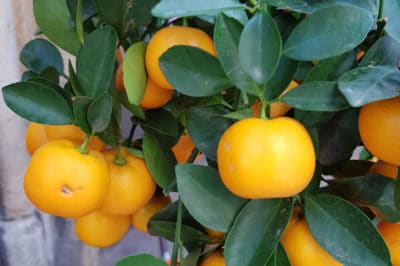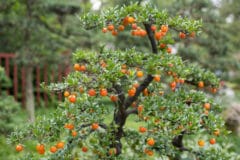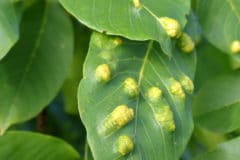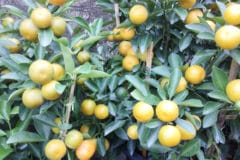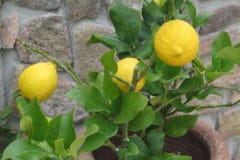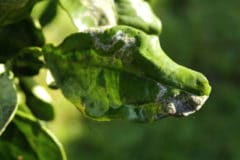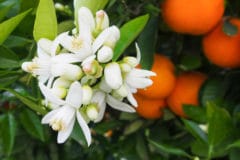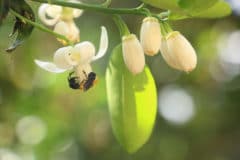While nearly any sweet orange tree will tolerate container life for a while, most are much happier in the ground. The cultivar best adapted to life indoors is the dwarf navel ‘Trovita’ (Citrus sinensis ‘Trovita’). It boasts fragrant spring flowers, glossy evergreen leaves and dainty, sweet winter fruit,
Hardy in USDA zones 8 to 11,’Trovita’ reaches just 7 to 10 feet high. To keep it smaller indoors, trim its roots periodically.
The Container
Start your indoor orange tree in a 24-inch pot or half whiskey barrel. Drill drainage holes in the base of pot if necessary. Place the pot on a heavy-duty plant trolley so you can move it as needed.
Planting the Tree
Things You’ll Need
- Plant saucer large enough to fit beneath your container
- Gravel
- Citrus potting mix
- Water
Set the container and its saucer on the plant trolley. Spread a layer of gravel over the container’s bottom, followed by a 4-inch layer of citrus potting mix. Gently spread the tree’s roots over the soil.
Add more soil, tamping lightly to eliminate air pockets, until it’s within 1/2 inch of the rim. Water to settle the soil, let the pot drain, empty the saucer and repeat.
Indoor Orange Tree Care
Sunlight and Temperature
An indoor orange tree needs eight to 12 hours of direct daily sun like it would get in a large, south-facing window. If you have a sunny outdoor spot, it can go outside when the nighttime temperature is consistently above 55°F. Indoors, it will do best at 65° (18.3°C) during the day and 55° to 60° (12.7° to 15.5°C) at night.
Expert gardener’s tips:
- When you put it outdoors, gradually move the tree from filtered to direct sun so its new leaves can adjust.
- No outdoor space? Open a window during warm weather to improve the air circulation around your tree.
Fertilizer
To meet your orange tree’s nutrient requirements without burning its roots, give it a slow-release organic, granular 2-1-1 fertilizer. It also needs the trace minerals:
- calcium
- manganese
- zinc
- iron
- liquid potassium silicate
Fertilize at the labels’ recommended rates for container plants.
Watering
Water your tree slowly and deeply whenever the soil feels dry but the rootball remains slightly moist. To prevent root rot, empty the drainage saucer right away.
